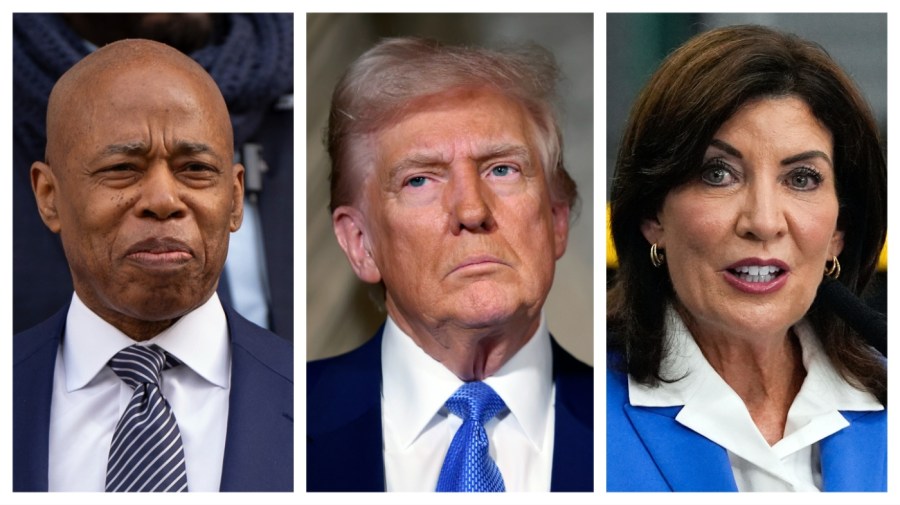
President Trump is roiling the politics of his native city — and the drama isn’t over yet.
A federal judge on Wednesday reserved judgment on whether he would accede to a massively controversial request from Trump’s Justice Department to halt the criminal prosecution of New York City Mayor Eric Adams (D).
The deal with Adams has caused uproar, with eight prosecutors resigning over the matter, and some key figures going public in their criticisms.
In the newest twist, New York Gov. Kathy Hochul (D) is publicly mulling whether to try to oust Adams from office — or whether to hope the mayor’s travails will sink him in the mayoral primary set for June.
Rep. Alexandria Ocasio-Cortez (D-N.Y.), with whom Adams has long-standing antagonism, is among those who have called for the mayor to be driven out if he will not resign.
“Adams’ coercion under Trump risks significant, long-term harm to the people of New York,” the congresswoman wrote on social media on Monday. “We cannot afford it.”
But other Democratic voices contend that there would be significant blowback against Hochul if she pushed Adams out rather than letting the electoral process play out.
“The governor, if she were to do this, would have real problems later,” New York-based Democratic strategist Hank Sheinkopf told this column. “Kathy Hochul is not to be underestimated or underrated as a pol, but this will really injure her if she says to the left, ‘You’re right, let’s kill the mayor.’”
Sheinkopf also contended that any act of overreach from Hochul could help Trump in the city — albeit to a modest extent, given that it remains a Democratic stronghold. Then-Vice President Harris rolled up a margin of almost 40 points over Trump in New York City last November.
Amid all of that, Trump on Wednesday gloated about his administration’s tactics in an unrelated matter: congestion pricing in New York City.
Congestion pricing went into effect earlier this year, supported by Hochul. It is intended to ease traffic in key areas of Manhattan, but is unpopular with many of those who would have to pay extra charges.
Transportation Secretary Sean Duffy announced that the federal government would step in to end the policy in a Wednesday letter to Hochul, saying the policy amounted to “a slap in the face to working class Americans and small business owners.”
Trump then took to social media to rejoice, “CONGESTION PRICING IS DEAD. Manhattan, and all of New York, is SAVED. LONG LIVE THE KING!”
The grandiose phrasing seemed like a trolling of Hochul. She duly responded: “We are a nation of laws, not ruled by a king.”
But wherever the congestion pricing row goes, it is the Adams matter that has broader political implications.
The question, at its heart, is twofold: Firstly, whether the Trump administration made a corrupt deal with Adams, offering him a way out of criminal charges so long as he supports the president politically; and secondly, whether there is any feasible legal or political remedy if the deal was indeed improper.
Adams was charged last September with bribery, wire fraud and soliciting illegal campaign contributions.
The crux of the charges — which Adams denies — is that he was plied with luxury travel perks by people connected with Turkey, which he allegedly concealed. Later, Adams allegedly leaned on Fire Department of New York (FDNY) officials to ensure a Turkish consular building in Manhattan would be opened promptly, despite the fact that it appeared unfit to pass a regular inspection.
Adams has responded to the charges by echoing the language Trump used about his own indictments, complaining about political prosecution and the supposed weaponization of the justice system against him.
According to this narrative, Adams has been targeted because of his break with former President Biden’s administration over immigration. Specifically, Adams has complained about the strains to the city’s finances and infrastructure caused by an influx of migrants — some bused to New York by Texas Gov. Greg Abbott (R).
Adams has also played nice with Trump, journeying to Mar-a-Lago for lunch shortly before the president’s January inauguration, and then attending the inauguration itself.
If the effort on the mayor’s part was to curry favor with Trump to ease his legal troubles, it worked. The Department of Justice announced earlier this month it was halting the case against the mayor.
But the Trump team’s efforts caused a legal firestorm.
Danielle Sassoon, the acting lead prosecutor in Manhattan — and someone with impeccable conservative credentials — ultimately resigned rather than go along with the deal proposed by acting Deputy Attorney General Emil Bove, who previously served as one of Trump’s lawyers during his hush money trial.
Sassoon, in a letter to Attorney General Pam Bondi in the days leading up to her resignation, alleged the deal amounted to a “quid pro quo” arrangement, where the Trump team was using the legal threat to Adams — and its power to lift that threat — as a lever to ensure his political cooperation.
The lead prosecutor in the case, Hagan Scotten, also resigned, excoriating the deal in a letter to Bove.
Scotten told Bove, “I expect you will eventually find someone who is enough of a fool, or enough of a coward, to file your motion. But it was never going to be me.”
Bove ultimately signed the motion himself, along with some other DOJ officials.
But at Wednesday’s hearing on whether the court would accept the dismissal of the charges against Adams, Judge Dale E. Ho seemed to focus on whether the charges against Adams could be reinstated and mulled whether the deal had “appearances of impropriety.”
The judge ultimately asked for more time, asking the parties for their “patience as I consider these issues carefully.”
Regardless of which side he falls on, the furor won’t be quelled anytime soon.
The Memo is a reported column by Niall Stanage.












